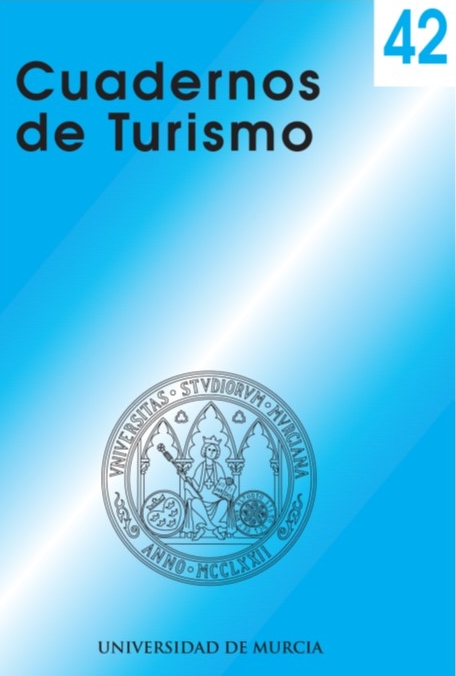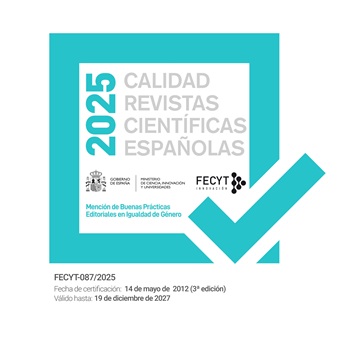Determinación del papel de las características demográficas de los consumidores en el proceso de formación de lealtad basada en aspectos socialmente responsables
Resumen
La responsabilidad social corporativa (RSC) se ha convertido en un elemento crucial en la estrategia corporativa de las compañías hoteleras. Una de las principales razones es que el desarrollo de este tipo de iniciativas favorece el desarrollo de mayores niveles de lealtad entre los consumidores. Igualmente, las características demográficas de los consumidores son una línea de investigación que tradicionalmente ha centrado la atención de multitud de investigadores por considerarse herramientas útiles para la segmentación de los mercados y la caracterización de los consumidores. Sin embargo, son pocos los estudios que han tratado de explorar el papel que juegan las características demográficas de los consumidores en sus respuestas comportamentales basadas en aspectos de RSC. De este modo, el objetivo de esta investigación es analizar el papel de tres características demográficas –género, edad y nivel educativo– en un modelo conceptual que relaciona las percepciones de RSC y la lealtad de los consumidores. Los resultados revelan que estas variables demográficas moderan diversas relaciones del modelo propuesto.
Descargas
-
Resumen530
-
PDF613
-
PDF 613
Citas
ANDERSON, J.C. y GERBING, D.W. (1988). «Structural equation modelling in practice: A review and recommended two-step approach», Psychological Bulletin, vol. 103, nº 3, pp. 411-423.
ARBUCKLE, J.L. (2014). IBM®SPSS® AMOSTM 23 User’s Guide. IBM
ARCHER, J. (1996). «Sex differences in social behavior: Are the social role and evolutionary explanations compatible? », American Psychologist, vol. 51, nº 9, pp. 909-917.
BALDERJAHN, I. (1988). «Personality variables and environmental attitudes as predictors of ecologically responsible consumption patterns», Journal of Business Research, vol. 17, nº 1, pp. 51-56.
BARON, R.M. y KENNY, D.A. (1986). «Moderator-mediator variables distinction in social psychological research: Conceptual, strategic, and statistical considerations», Journal of Personality and Social Psychology, vol. 51, nº 6, pp. 1173-1182.
BOHDANOWICZ, P. y ZIENTARA, P. (2009). «Hotel companies’ contribution to improving the quality of life of local communities and the well-being of their employees», Tourism and Hospitality Research, vol. 9, nº 2, pp. 147-158.
BROWN, T.J. y DACIN, P.A. (1997). «The company and the product: corporate association and consumer product responses», Journal of Marketing, vol. 61, pp. 68-84.
BUSS, D. M. (1996). The evolutionary psychology of human social strategies. Higgins, Edward Tory (Ed); Kruglanski, Arie W. (Ed). Social psychology: Handbook of basic principles. New York, NY, US: Guilford Press, pp. 3-38.
CHAN, E.S.W. (2011). «Implementing environmental management systems in small and medium-sized hotels: Obstacles», Journal of Hospitality & Tourism Research, vol. 35, nº 1, pp. 3-23.
CRONIN, J.J., BRADY, M.K. y HULT, G.T.M. (2000). «Assessing the effects of quality, value, and customer satisfaction on consumer behavioral intentions in service environments», Journal of Retailing, vol. 76, nº 2, pp. 193-218.
DIAMANTOPOULOS, A., SCHLEGELMILCH, B. B., SINKOVICS, R.R, y BOHLEN, G.M. (2003). «Can socio-demographics still play a role in profiling green consumers? A review of the evidence and an empirical investigation», Journal of Business Research, vol. 56, nº 6, 465-480.
EAGLY, A.H. (1987). Sex differences in social behavior: A social-role interpretation. Hillsdale: Lawrence Erlbaum Associates.
EVANSCHITZKY, H. y WUNDERLICH, M. (2006). «An examination of moderator effects in the four-stage loyalty model», Journal of Service Research, vol. 8, nº 4, pp. 305-345.
FORNELL, C. y LARCKER, D.F. (1981). «Evaluating structural equation models with unobservable variables and measurement error», Journal of Marketing Research, vol. 18, nº 1, pp. 39-50.
GILLY, M.C. y ZEITHAML, V.A. (1985). «The elderly consumer and adoption of technologies», Journal of Consumer Research, vol. 12, nº 3, pp. 353-357.
HAIR, J.F., BLACK, W.C., BABIN, B.J. y ANDERSON, R.E. (2010). Multivariate Data Analysis. Pearson Prentice-Hall, Upper Saddle River.
HAN, H., HSUB, L.T., LEE, J.S. y SHEUD, C. (2009). «Are lodging customers ready to go green? An examination of attitudes, demographics, and eco-friendly intentions», International Journal of Hospitality Management, vol. 30, nº 2, pp. 345-355.
HOLLOWAY, C.J. (2004). Marketing for Tourism. Prentice Hall, Harlow.
HOMBURG, C. y GIERING, A. (2001). «Personal characteristics as moderators of the relationship between Customer satisfaction and loyalty: An empirical analysis», Psychology & Marketing, vol. 18, nº 1, pp. 43-66.
HENRIQUE, J.L. y DE MATOS, C.A. (2015). «The influence of personal values and demographics variables on customer loyalty in the banking industry», International Journal of Bank Marketing, vol. 33, nº 4, pp. 571-587.
KELLEY, S.W., DONNELY, JR., J.H. y SKINNER, S.J. (1990). «Customer participation in service production and delivery», Journal of Retailing, vol. 66, nº 3, pp. 315-335.
KONRAD, A.M., RITCHIE JR., J.E., LIEB, P. y CORRIGALL, E. (2000). «Sex differences and similarities in job attribute preferences: a meta-analysis». Psychological Bulletin, vol. 126, nº 4, pp. 593-641.
LAROCHE, M., BERGERON, J. y BARBARO-FORLEO, G. (2001). «Targeting consumers who are willing to pay more for environmentally friendly products», Journal of Consumer Marketing, vol. 18, nº 6, pp. 503-520.
LUIZ J.H. y DE MATOS, C.A. (2015) «The influence of personal values and demographic variables on customer loyalty in the banking industry», International Journal of Bank Marketing, vol. 33, nº 4, pp.571-587.
MAEL, F. y ASHFORTH. B. (1992). «Alumni and their alma mater: A partial test of the reformulated model of organizational identification», Journal of Organizational Behavior, vol. 13, nº 2, pp. 103-123.
MARTÍNEZ, P., PÉREZ, A. y RODRÍGUEZ DEL BOSQUE, I. (2012). «Análisis de la práctica corporativa de la responsabilidad social en el sector turístico: Un estudio de casos», Cuadernos de Turismo, nº 30, pp. 145-164.
MARTÍNEZ, P. y RODRÍGUEZ DEL BOSQUE, I. (2013). «CSR and customer loyalty: The roles of trust, customer identification with the company and satisfaction», International Journal of Hospitality Management, vol. 35, pp. 89-99.
MITTAL, V. y KAMAKURA, W. A. (2001). «Satisfaction, repurchase intent, and repurchase behavior: Investigating the moderating effect of customer characteristics», Journal of Marketing Research, vol. 38, nº 1, pp. 131-142.
MORGAN, R.M. y HUNT, S.D. (1994). «The commitment-trust theory of relationship marketing», Journal of Marketing, vol. 58, pp. 20-38.
PATTERSON, P. (2007), «Demographic correlates of loyalty in a service context», Journal of Services Marketing, vol. 21, nº 2, pp. 112-121.
PÉREZ, A. y RODRÍGUEZ DEL BOSQUE, I. (2013). «Customer personal features as determinants of the formation process of corporate social responsibility perceptions», Psychology & Marketing, vol. 30, nº 10, pp. 903-917.
PÉREZ, A. y RODRÍGUEZ DEL BOSQUE, I. (2015). «How customers construct corporate social responsibility images: Testing the moderating role of demographic characteristics», Business Research Quarterly, vol. 18, nº 2, pp. 127-141.
PIVATO, S., MISANI, N. y TENCATI, A. (2008). «The impact of corporate social responsibility on consumer trust: the case of organic food», Business Ethics: A European Review, vol. 17, nº 1, pp. 3-12.
QUAZI, A.M. (2003). «Identifying the determinants of corporate managers perceived social obligations», Management Decision, vol. 41, nº 9, 822-831.
ROBERTS, J.A. (1996). «Green consumers in the 1990s: profile and implications for advertising», Journal of Business Research, vol. 36, nº 3, pp. 217-231.
SAAD, G. y GILL, T. (2000). «Applications of evolutionary psychology in marketing», Psychology & Marketing, vol. 17, nº 12, pp. 1005-1034.
SANDAHL, D.M. y ROBERTSON, R. (1989). «Social determinants of environmental concern: specification and test of the model», Environment and Behavior, vol. 21, nº 1, pp. 57-81.
SAN MARTÍN, S. (2006). «La generación de la confianza del consumidor en el establecimiento comercial. Una perspectiva multinivel», Revista Europea de Dirección y Economía de la Empresa, vol. 15, nº 1, pp. 201-224.
SIRDESHMUKH, D., JAPDIG, S. y BERRY, S. (2002). «Customer trust, value, and loyalty in relational exchanges», Journal of Marketing, vol. 66, nº 1, pp. 15-37.
SO, K.K.F, KING, C., SPARKS, B. y WANG, Y. (2013). «The influence of customer brand identification on hotel brand evaluation and loyalty development», International Journal of Hospitality Management, vol. 34, pp. 31-41.
VÁZQUEZ-CARRASCO, R. y FOXALL, G.R. (2006). «Influence of personality traits on satisfaction, perception of relational benefits, and loyalty in a personal service context», Journal of Retailing and Consumer Services, vol. 13, nº 3, pp. 205-219.
WAKEFIELD, L. y BAKER, J. (1998). «Excitement at the mall: determinants and effects on shopping response», Journal of Retailing, vol. 74, nº 4, pp. 515-39.
WALSH, G., EVANSCHITZKY, H. y WUNDERLICH, M. (2008). «Identification and analysis of moderator variables. Investigating the customer satisfaction-loyalty link», European Journal of Marketing, vol. 42, nº 9-10, pp. 977-1.004.
ZEITHAML, V.A., BERRY, L.L. y PARASURAMAN, A. (1996). «The behavioral consequences of service quality», Journal of Marketing, vol. 60, pp. 31-46.
Las obras que se publican en esta revista están sujetas a los siguientes términos:
1. El Servicio de Publicaciones de la Universidad de Murcia (la editorial) conserva los derechos patrimoniales (copyright) de las obras publicadas, y favorece y permite la reutilización de las mismas bajo la licencia de uso indicada en el punto 2.
2. Las obras se publican en la edición electrónica de la revista bajo una licencia Creative Commons Reconocimiento-NoComercial-SinObraDerivada 3.0 España (texto legal). Se pueden copiar, usar, difundir, transmitir y exponer públicamente, siempre que: i) se cite la autoría y la fuente original de su publicación (revista, editorial y URL de la obra); ii) no se usen para fines comerciales; iii) se mencione la existencia y especificaciones de esta licencia de uso.
3. Condiciones de auto-archivo. Se permite y se anima a los autores a difundir electrónicamente las versiones pre-print (versión antes de ser evaluada) y/o post-print (versión evaluada y aceptada para su publicación) de sus obras antes de su publicación, ya que favorece su circulación y difusión más temprana y con ello un posible aumento en su citación y alcance entre la comunidad académica. Color RoMEO: verde.





_.jpg)









